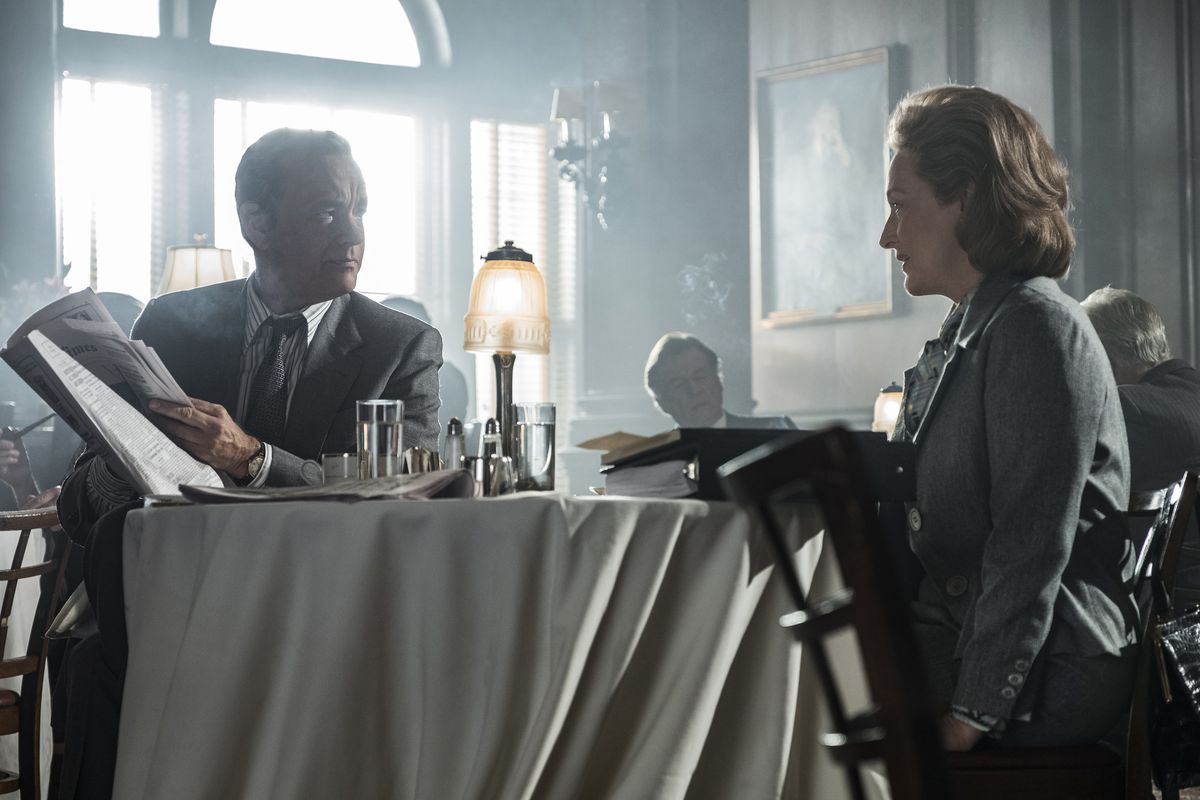In “But How Gay Is It?”, we seek to answer the biggest questions you have about a new movie release in theaters now including, most crucially, the titular question. Does the movie have any queer characters? Are there stories involving same-sex lovers? Which gay icons star in the film? We’re bringing you all that and more.
What is The Post?
Steven Spielberg read a spec script by a relatively unknown writer named Liz Hannah about The Washington Post’s decision-making in printing the Pentagon Papers. He loved it, and brought on Spotlight scribe Josh Singer to help mold the script into its final form. He cast Meryl Streep, Tom Hanks, and a coterie of your favorite TV actors as the ensemble. And he got it out just in time for Christmas.
That is The Post, an utter delight and thrill that makes you care deeply about a publishing decision.
Who’s in it?
Streep plays Kay Graham, the publisher of the Post at the time. Hanks is Ben Bradlee, the paper’s editor. Filling out the newsroom and executive board are beloved TV actors like Bob Odenkirk (Better Call Saul), Carrie Coon (The Leftovers), Bradley Whitford (The West Wing), and more. There’s even a couple of theater vets in there: Tracy Letts as one of Kay’s closest advisors, and Jessie Mueller as a style section writer.
Most important of all for our little queer hearts, Sarah Paulson plays Bradlee’s wife, Tony. She’s mostly a side presence, but gets one meaty monologue that radically changes the movie from being a workmanlike bit of historical recreation to something quite feminist and powerful.
Why should I see it?
It’s really terrific. I know that’s not always the end-all, be-all different people have different tastes but it’s nice to see something that’s just so clearly a home run happening in front of your eyes. I’ve seen The Post twice now, once at a screening, and once on a DVD screener copy. It plays equally well on a big screen and on a TV. That’s some well-built, well-oiled cinema.
But I’d also say The Post is vital viewing in Trump’s America. At a time when the press is under attack sometimes literal, physical attack in the United States, seeing this critical moment in journalistic history is arguably necessary viewing. This is the moment when editors and writers learned being friendly with power was directly contradictory to their mission, and thus redoubled their efforts to hold politicians accountable. Spielberg crafts the whole story with love and admiration for journalism; it’s pretty easy to fall under his spell.
But how gay is it?
Oh, it’s totally not.
I mean, sure, Paulson’s presence is wonderful, but there’s no gay content here. Relationships don’t come up much at all, besides Tony Bradlee being a supporting player and Kay Graham talking a lot about her late husband. This is about the work, and it’s to the movie’s credit that it stays so laser-focused.
That said, the movie is remarkably feminist, particularly from a director like Spielberg who infrequently makes movies about women. (The Color Purple remains a landmark, if dated, line on his résumé.) So any queer fans looking to get inspired by Streep taking the reins as the men around her shout her down and discount her opinions will be well-served.
I keep hearing something about a gold caftan?
Oh shit, I can’t believe I almost forgot the caftan! The caftan almost makes The Post gay. That’s how good this fucking caftan is. Streep’s biggest scenes and she gets two pretty amazing scenes, full of the kind of skillful acting Streep’s biggest fans will recognize from her best work take place in this caftan. It is gold, it flows, and it’s exactly the kind of thing you’d imagine Kay Graham would wear. It is spectacular.
Does the tonal shift to being a feminist movie in the last act feel forced at all?
You know, I’d be lying if I said no. There’s a clear moment where you can tell Liz Hannah’s voice takes over in the script. Before, a lot of it feels Spotlight-esque, no doubt in large part thanks to Josh Singer’s involvement. But when Streep and Paulson take over? There are probably half a dozen scenes that so persuasively and memorably argue for why Kay Graham’s identity as a woman was so important to this moment in history, you’ll be hard-pressed not to cry.
Will Streep be Oscar-nominated for this, thus extending her acting nod record to 21 nominations?
You bet your ass she will.
The Post is in select theaters now.
Don't forget to share:
Help make sure LGBTQ+ stories are being told...
We can't rely on mainstream media to tell our stories. That's why we don't lock our articles behind a paywall. Will you support our mission with a contribution today?
Cancel anytime · Proudly LGBTQ+ owned and operated
Read More in Culture
The Latest on INTO
Subscribe to get a twice-weekly dose of queer news, updates, and insights from the INTO team.
in Your Inbox













